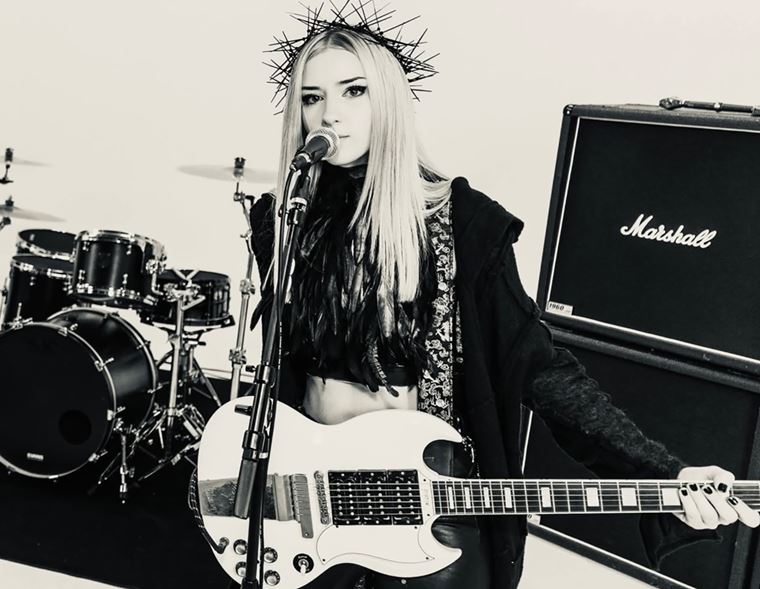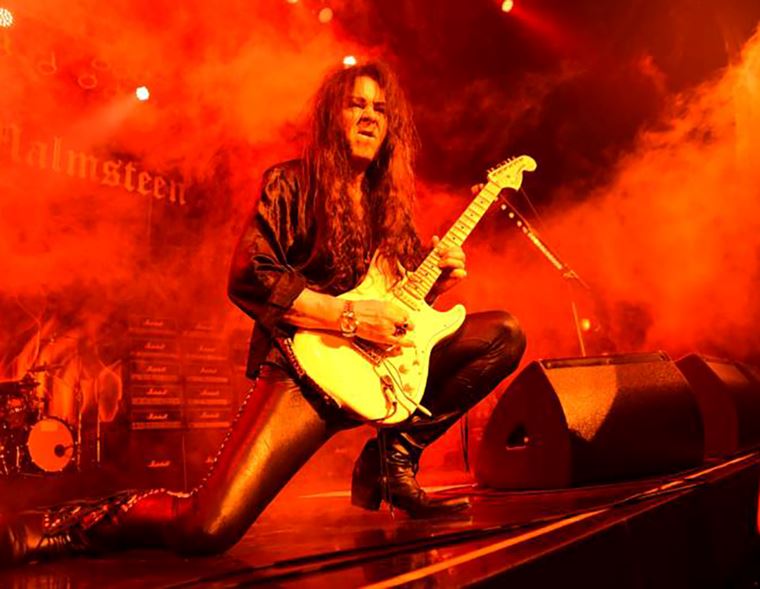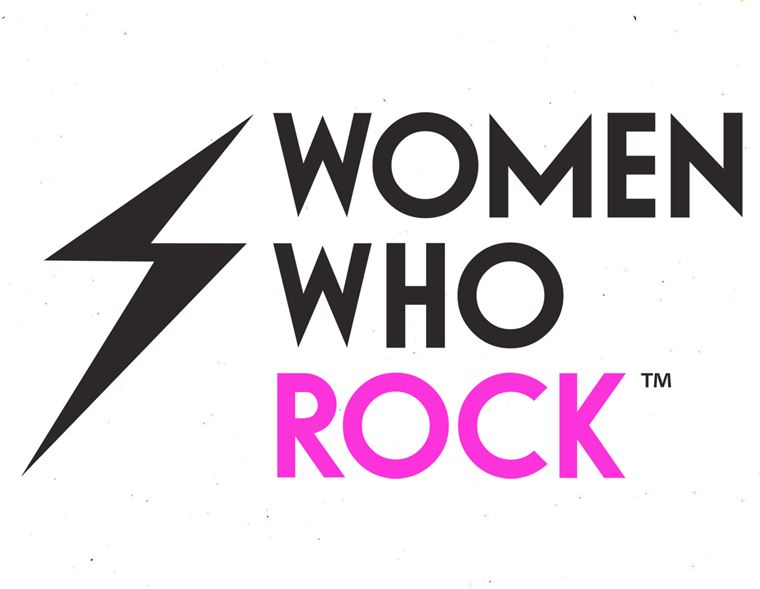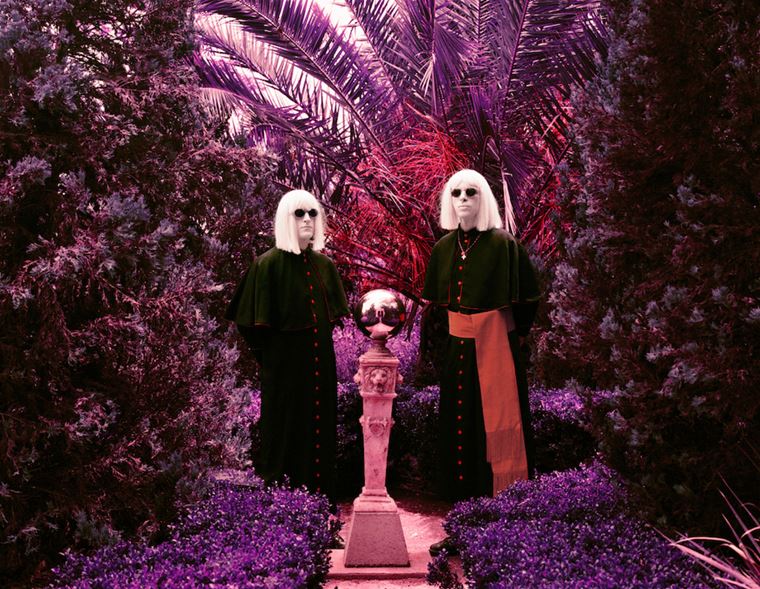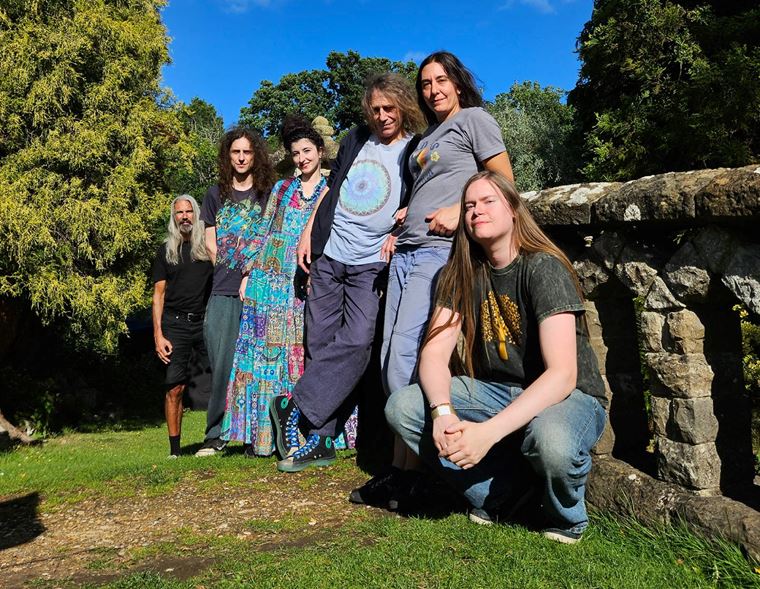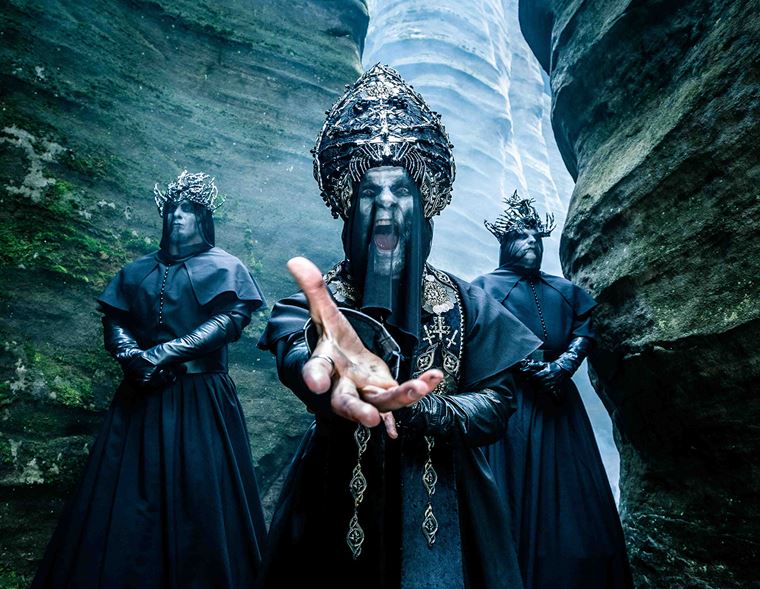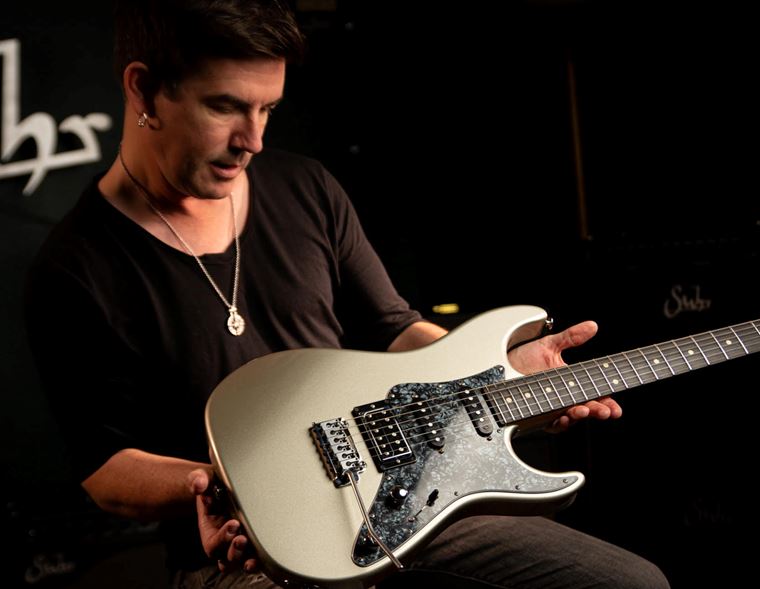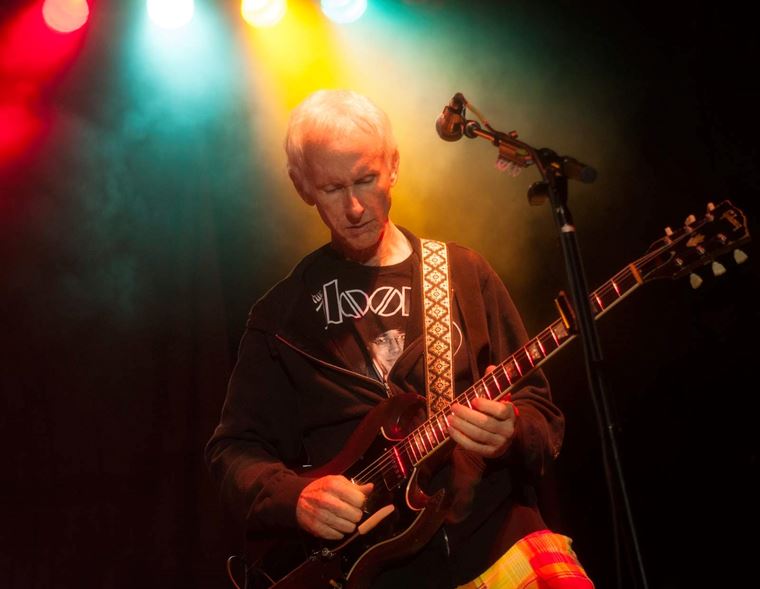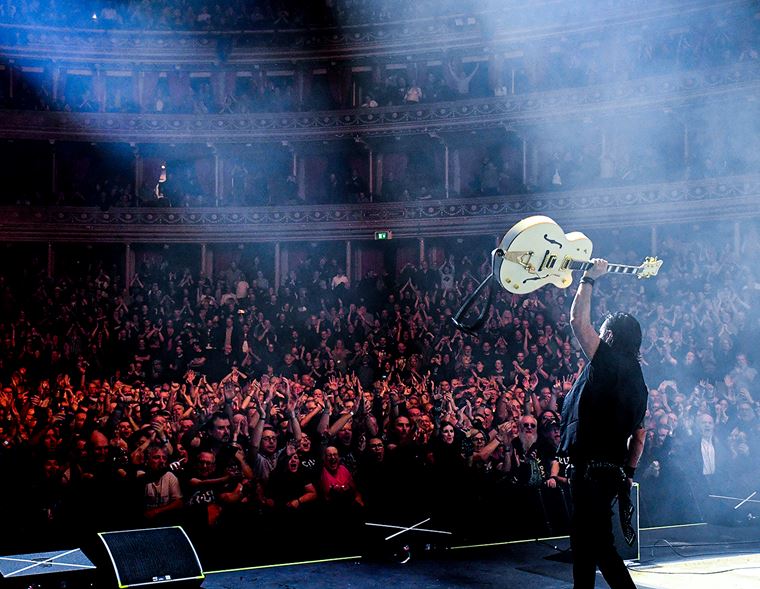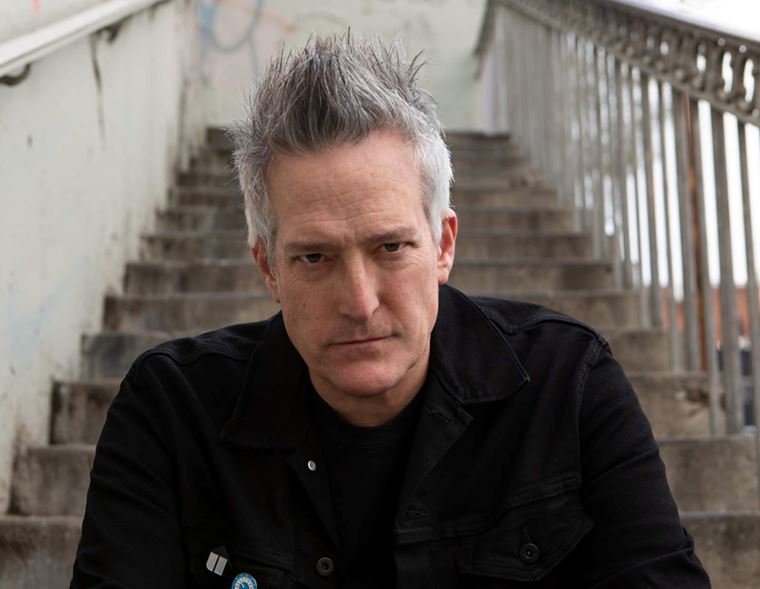The guitarguitar Interview: Skunk Anansie's Ace
Published on 09 September 2019
All I hear from outside is massive bass frequencies pounding through the thick venue’s walls. It’s five to three on a Saturday afternoon and I’m standing between the O2 Academy and the huge truck parked outside it. I’m early to meet Ace from Skunk Anansie and what I’m hearing turns out to be a live desk recording from last night’s show.
Ace himself appears at the back door, beckoning me in. He’s a familiar sight to this fan: the goatee, the baseball cap...and he’s bristling with energy, something I learn is something of a natural state for him.
Skunk Anansie are in town as part of their 25th Anniversary celebrations. A searing, 25-song-strong double record has been recently released displaying, for the first time, the band in their fully ferocious live aspect. Since their debut record in 1995, Skunk Anansie have skilfully trodden that delicate line of being a super-hard rocking band who also put out legitimately huge ballads. Their sound is simultaneously apocalyptic and deeply vulnerable.
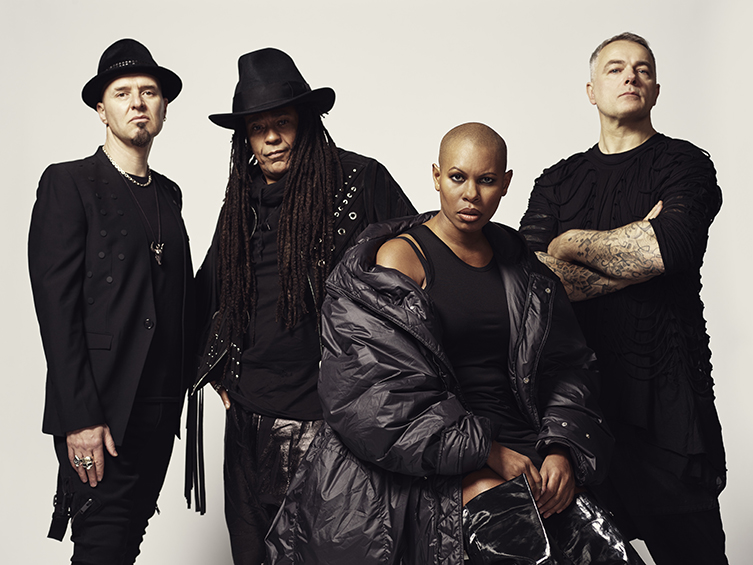
No wonder so many people love them!
I’m interested in Ace for guitar reasons primarily, but also for his savvy, ahead-of-the-game attitude. He has, for a long time, been an award-winning musician as well as a journalist (for Guitarist magazine), author, course leader and now director at the Academy of Contemporary Music. His entrepreneurial nous and industry wisdom are things I want to hear more about!
Ace leads me into the empty arena as the sound man continues to blast out tunes and we skulk about looking for a quiet place to sit and chat. In the end, we head upstairs and find the door to the upper bar area open. Diving in, we pull up seats at the bar and had our conversation in near darkness! Neither of us could find the lights!
Ace was up for talking about anything and gave me lots of fantastic information. In the end, we spoke for well over an hour before heading to the stage to check out his equipment. In a lucky turn of events, bassist Cass Lewis and drummer Mark Richardson were already down there! We checked out Ace’s guitars, amps and pedals before they began sound checking.
What follows is an almost verbatim transcription of our conversation. I’ve actually had to cut little bits here and there due to time constraints! This is one big and all-encompassing interview! We pick up the story here as Ace tells me about the sound coming from the stage...
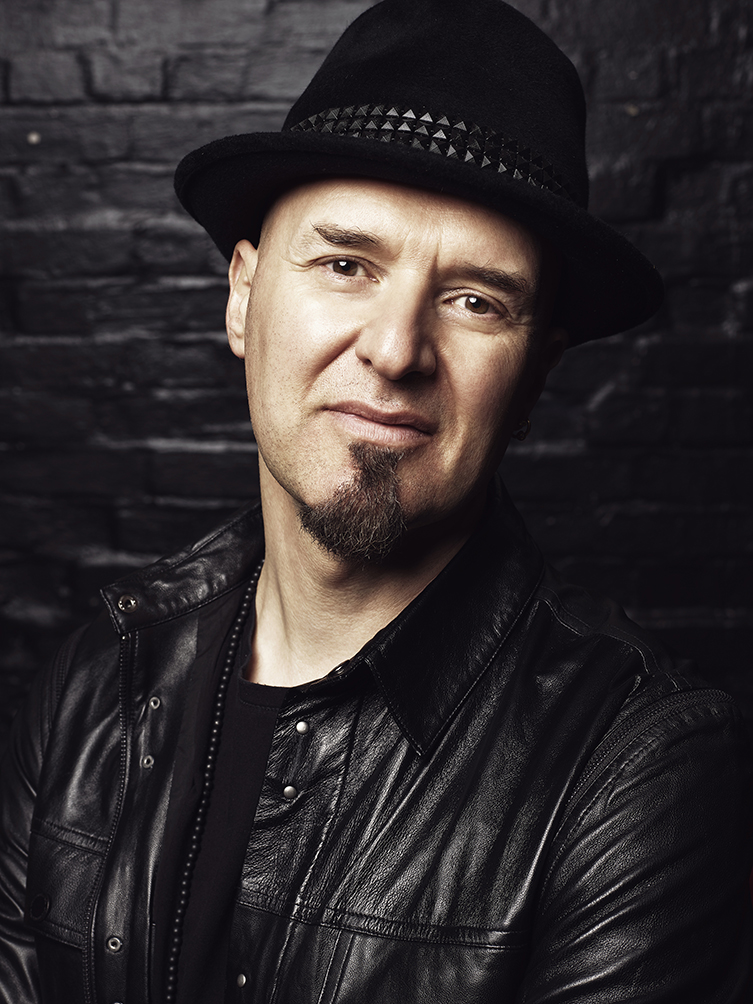
Ace: Yeah, basically what he’s doing is a virtual soundcheck. He has a recording of the gig from last night and he’s EQ’ing the room and then we do our soundcheck at 4 o’clock. So our proper noise starts then. It’s good to go in the room because when he gets it all balanced, you can hear what it sounds like off the stage.
Guitarguitar: So, when you come to soundcheck, a lot of the work is done already.
A: Yeah, yeah and then we’ll actually play, and he’ll do the rest of it.
GG: Nice, so how far into the tour are you just now?
A: We’ve been out since June: we did some UK stuff like Bristol and Brixton, and headed to Europe to the festivals and back to the UK, so this is about 40 dates in, something like that.
GG: Wow, no way!
A: Yeah.
GG: How’s it been for you?
A: Really good, really good. All of our gigs are sold out, which is amazing, and all the festivals have been amazing, I mean, it’s gone from doing a festival of about...you know, 6 thousand people up to our biggest gig ever in our career, which was 700,000.
GG: No way!
A: Yeah! In Poland, Polish Woodstock.
GG: But 700,000!
A: Yeah, yeah, yeah!
GG: I can’t even comprehend what that would even look like!
A: Yeah, it’s mad! You can’t see the end of it, it was just people, like...it made Glastonbury look like a club!
GG: Haha! Yeah because isn’t Glastonbury normally something like 100-120 thousand?
A; Yeah, yeah, it’s just massive, it’s called the Polish Woodstock, it’s the biggest thing and we were headlining it as well, and we were number 1 in the Rock charts, so it was like everything, the stars aligned for that!
GG: What a moment! And as a performer, I mean...those numbers! How does that feel? Does it make a difference after a certain level?
A: Well, it does because it’s overwhelming at that size, because you’re kind of like...it’s not the fact that it’s the people, it’s like when you’re there, there’s no soundcheck cuz there’re bands playing all day, you just have to walk on and play! So, you know, if you’ve had a soundcheck and are prepared for it, you’re a bit more relaxed about it, so I’m just like: ‘right, I’ve got a really big gig and I’ve got to just walk on and start playing: I’m just praying that it all works!
GG: Yeah.
A: So that kind of makes you nervous but when we did that show, I was like ‘I’m not going out the front until I’m going on stage’ because it was so big, it would just make me nervous! So I just waited, I hadn’t even seen the crowd! I waited backstage and when I walked on, I put my guitar on and my legs were just shaking, for the first time ever! But the crowd just went on forever, and I was just ready to play the first note and I was waiting for the intro tape to finish and I was thinking ‘pleeeease let this sound good!’ and then Ba-na-na-na, it was fine, and I just enjoyed it.
GG: Right! And would that be a fly rig or did you get your own equipment?
A: That was our stuff, yeah. We’ve only flown in for one show out the whole lot, everything else, our gear has followed us around.
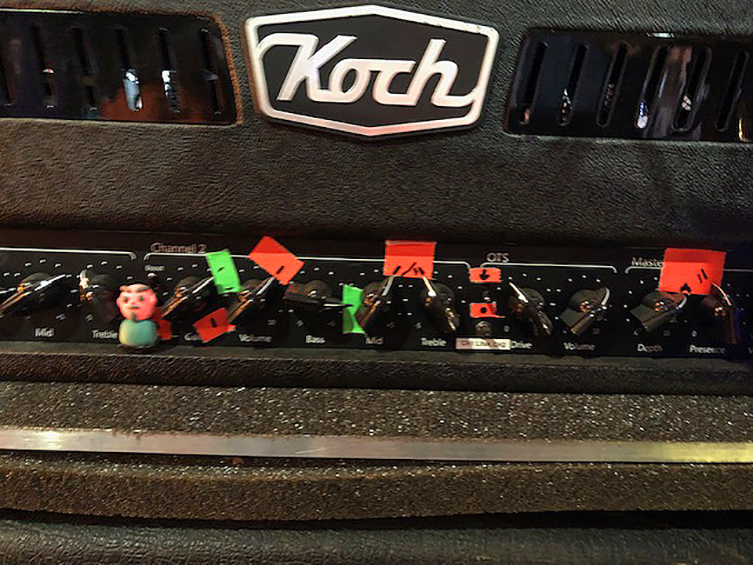
GG: That makes a big difference.
A: Yeah.
GG: You mentioned getting nervous there, understandably haha! But is that something that generally doesn’t happen?
A: No. Well, the shows that make you nervous are the ones that are kind of ‘important’. So, if it’s like a big TV, or a big live radio, or some ultra-massive crowd, they’re the sort of ones you get a bit nervous about. Everything else is, because we’ve been doing it so long, it’s more excitement than nerves.
GG: Yeah, you just want to get unleashed and go for it!
A: Yeah! I get this thing where, instead of nerves, I get really tired before I go on stage! All of a sudden I think ‘Ahh, I’m really tired: how am I gonna get through this?’ Haha! Literally about ten minutes before I go on and then I go on and I’m absolutely fine. Maybe that’s my version of nerves!
GG: That’s quite useful nerves, though, isn’t it?
A: Hahaha Yeah!
GG: So, is this tour a celebration of the 25 Live @ 25 album?
A: Yeah, this is the 25 anniversary tour so we got lots of old songs in the set, the set is a lot longer than it normally is, we’ve got another 5 or 6 songs, we play stuff from all of the records, got a new single, we’ve got a single that hasn’t even been recorded yet, so there’s new music in there, lots of old stuff right back to the first album. We’ve got merch done with the ‘25’ thing, this is kind of like, yes, we are actually celebrating! Cuz when we were twenty years, we didn’t really do anything and so when it became 25 years we thought: ‘Yeah, we need to do something!’
GG: It’s a big deal!
A: Yeah, it’s actually worked out a big deal because a lot of people, they’ve picked up on it and I think that’s probably one of the reasons that it’s done so well, to be honest!
GG: Yeah! It’s one of those ones where, I don’t even want to use the word ‘contemporaries’, because your contemporaries are more like Rage Against the Machine and Nine Inch Nails, but most mid 90s British bands are...it’s either nostalgia or they’ve just vanished. Skunk Anansie doesn’t feel like nostalgia to meet at all.
A; Yeah, I think it’s because what we’ve done is, we’ve constantly, even though we had our break, and that was ten or eleven years ago now, is we’ve constantly made new music that’s ahead of us, if you know what I mean? We don’t make, like, the same record. But because we’ve constantly toured and constantly released, it’s not like say a band like...let’s say for example we played with Sleeper the other night, they were great actually, where they’ve gone away for years and years and years, and then they’ve come back and gone ‘Actually, we’re gonna go on tour now’...and then make a record.
GG: Yeah.
A: So that becomes a bit more nostalgic because they’ve just come back out again after not doing anything for years, whereas we carried on making records, and progressed and progressed. And Skunk music is quite modern, so I think that’s why we’ve manged to survive it, because bands like us and Nine Inch Nails, and people like that, are always doing something that’s kind of...current? You know, even a band like Tool, even if they don’t do anything for a long time, they’re still doing some shows, still doing stuff.
GG: I think you might be right.
A: Yeah, still doing stuff!
GG: As well as, to begin with, off the bat, you have the riffs, the big bass, the Rock: it’s heavier than standard Rock, getting towards Metal...
A: Yeah, yeah
GG: ...but then you also have a bunch of ballad-y songs. And, with the exception of maybe the Smashing Pumpkins, who could also do that, so many bands give you one or the other...
A: Yeah. We played with Prophets of Rage the other night, that was amazing! It was like Rock royalty, it was all the right people, you had Chuck D, B Real, DJ Lord and the guys from Rage Against the Machine, and they played all of the hits: all the Public Enemy, Cypress Hit and Rage songs. Every song was a hit: it was amazing! But that’s their thing and they lead it. But if you want to survive as a band, especially a British band, because America’s slightly different, but as a British band you have to have the light and shade, because everyone loves a ballad, right? And everyone loves people who can sing.
GG: Yes.
A: So Skin can sing, so that can ride you through the ballads, the soft songs, the beautiful ‘singer’ songs, then you got really heavy stuff, which you really, really enjoy, but it may still be a bit of a niche. So, you you’ve fulfilled the niche as well as the general public. And that’s what keeps you going, you know? Getting a ballad-y hit single, that can ride you through your next heavy epic. Do you know what I mean?
GG: Yeah yeah, that’s a totally good way to put it! Especially when someone like Skin is not just a kind of Nina Simone-type crooner: she can also kick out the jams and scream the heavy stuff too. Not many singers can do both.
A: Exactly. And that’s what you don’t get: with Rage, you don’t get singing.
GG: No, you don’t.
A: But you get all those great hits, and they’re sticking the Cypress Hill and all that lot in. It’s fantastic.
GG: All they need to do is get a sweet ballad in there and they’ll be unstoppable.
A: Haha, yeah!
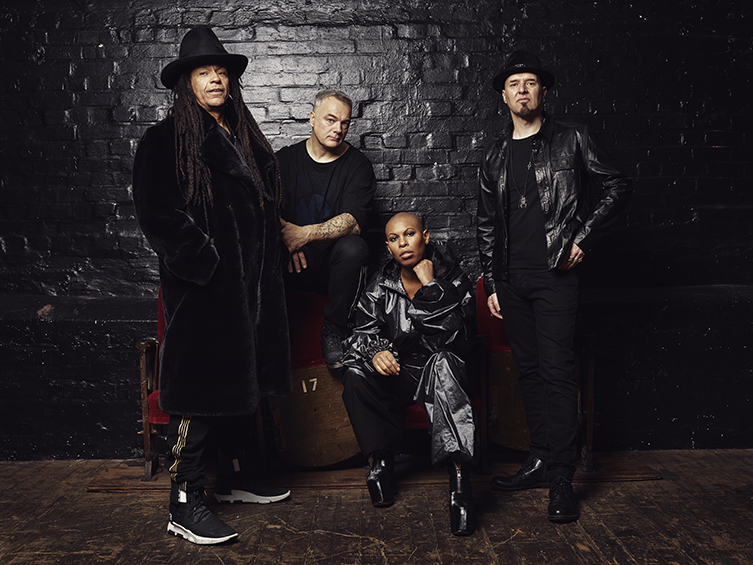
GG: I’ve always had this unshakeable feeling that the 90s were going somewhere brave and new, but then the millennium happened, and we didn’t get it...
A: I think there was something special about the 90s. I mean, the 80s I remember as being really good as a real ‘fun time’ in music; it was all like Howard Jones and Thompson Twins for the Pop, good Pop, and for the Rock it was all sunshine LA Metal, all that (sings) ‘have a gooood tiiiime!’ and so that was like a fun kinda era, it was almost like an industry of stuff. It was like ‘alright, there’s your pop industry, with your fantastic Stock, Aitken & Waterman; there’s your Rock industry, it’s all about glam and hairspray, people having a good time and buying records cuz they’re like ‘yeah, this is the dream!’ All of a sudden, the 90s came, and it just kind of radically changed, didn’t it? It was all about people’s views, different people getting together in different bands, it was all about different sounds, the whole thing was an amazing time! And by the end of the 90s, obviously everyone had perfected that and got it down to a tee, maybe back to what we were like in the 80s, where Rock and Metal is ‘this’: Slipknot, blah blah blah, those kinds of records, you know, they’ve got that going, Dance music is ‘this’, Armand Van Helden right up to the EDM people...everyone’s gone back into their boxes again!
GG: Got you.
A: So maybe we’ll have like a decade of that, and then maybe it’ll change again! Maybe it’ll change again soon! People will go like Punk came in; they’ll go ‘you know, we’re a bit bored by the compartmentalised stuff and they’ll change again. I don’t know, I really don’t know! But it was an amazing time, I have to say, for me the 90s was, there was something about it which was an age of innocence, really free, no computers at the beginning of it so it (recording) was all on tapes so people had to play, you know? The mistakes were part of it! And when you listen back to those early Pearl Jam records, Rage Against the Machine, Smashing Pumpkins, there’s something in those records that doesn’t exist now.
GG: Yes!
A: And there’s more space in them as well, because we couldn’t double track, overlay a million times and chop it and make it perfect. There was something organic about it. And it was a whole world of discovery because fashion came with it as well. The kids were like, overnight, Nirvana came out and everybody’s back to their ripped jeans and all that stuff.
GG: Totally! I’m glad that question made sense to you, haha! Okay, tangent here. You guys are a live Rock band: how does the writing process work for you guys?
A: Exactly like that: in a room, with some gear, I have a little amp/pedal set up, and then we just sit and right songs. That’s just what we do! Sit and write songs!
GG: Oh, cool! Do you have, like stockpiles of riffs that you bring along?
A: Yeah, I play some riffs, Skin sings some melodies, Cass’ll add some basslines, all that type of thing. Well talk to Mark and say, ‘what about this kind of groove?’ and he’ll come up with something. We’ll just work on it, and as soon as we get one thing that sticks, then we’ll go “Right, OK: let’s make the other parts”. We might do something and go ‘that’s a really good chorus’, “that’s a really good riff”, all playing and jamming, we all like it, so let’s stick a middle eight on that, lets stick a bridge into it.
And we would work on it...mostly we would write two songs a day, right? As skeletons, and at the end of a week or two we’d go back, and we would select the ones we thought had the potential and just finish them off. Not perfectly, just enough to go “there’s the structure”: we might not have all of the choruses done, or all the parts, but you could play it on an acoustic guitar or a rhythm section and get through the song.
And we just record it on our phones. We used to use better stuff, computers and so on, but in the end, we just put it on the phone, send it to the producer, and just go ‘that’s it’. There’s scope there. And then before we go into the recording session, we probably do pre-production for a week or something like that, tighten it all up and then go into the studio and cut them. And we’re still old-school in a way, we still cut most of them live and then overdub what we need.
GG: Wow! And on that particular note, let’s talk about recording and overdubbing: you have a massive guitar sound on the records, which you can of course achieve with overdubs, double tracking and so on. But how will you achieve that tonight, live?
A: Well, you know, the thing is, the massive guitar sound on the records is not that massive, it’s just space, right? It’s usually one guitar!
GG: Really?
A: Yeah, but it’s split. So, I’ll have two amps, and I’ll have some pedal in line, whatever, and I’ll just play the part, right, and it just comes out both sides.
GG: Right, you’ve got mics picking it up?
A: Yeah.
GG: So there’s two recordings of your one part?
A: Yeah, yeah and then we’ll split that, and I’d maybe do overdubs on certain things, just make it a bit bigger sounding, but that’s only the same part. So that’s one part for the song, then maybe an overdub of the same part with maybe a different guitar, and after that it’s just little melodies. So actually, if you listen to it on headphones, it’s not actually that many guitars. There were more back in the 90s when we had different producers and they’d go ‘let’s put an acoustic guitar on top of that’, ‘put the melody there’ or a solo or harmony. With Andy Wallace and all those kinds of big guys, with GGGarth, it was like basically, play the guitar once, and then play it exactly the same again. That’s your rhythm track. So, play it once with a Telecaster and once with a Les Paul, there you go, that’s your rhythm track. Now we’re gonna out melodies on and acoustic, things like that.
As we’ve gotten older, it’s gotten less. We were mixing a song, this song called ‘Sticky Fingers in Your Honey’, right (laughs), and it was really heavy, one of the heaviest songs we’ve ever done. The mixer said to me, ‘I wanted to double track it, but there was only one guitar on the whole track!” I was like “Oh! What did you do?” and he said “Well, when I mixed it, I kind of split it, I did the stereo effect on it”. But it actually came to him with one guitar.
And that (song) was cut like ‘Skank Heads’ or something, where we were just all in the room.
GG: That gives you that little element that’s kind of missing from a lot of Rock music that gets tracked one thing at a time.
A: You know what it is? It’s a lot of space. Listen to Rage Against the Machine, that sound massive, right? But you listen to it really closely, you think it’s one guitar on there, but he’s double tracked his guitars on there. But he’s double tracked them so tight, you can’t really tell: it just sounds like one huge guitar.
So, when we’re live, we recreate it exactly the same. I have one guitar and two amp stacks, right? One is this Marshall (JCM 900) and one is this Koch stack which is a prototype I’m using. So, when you’re listening in stereo, you got your two guitars coming out big, and then when I go to clean, there’s a stack in the middle, right, with a split on it.
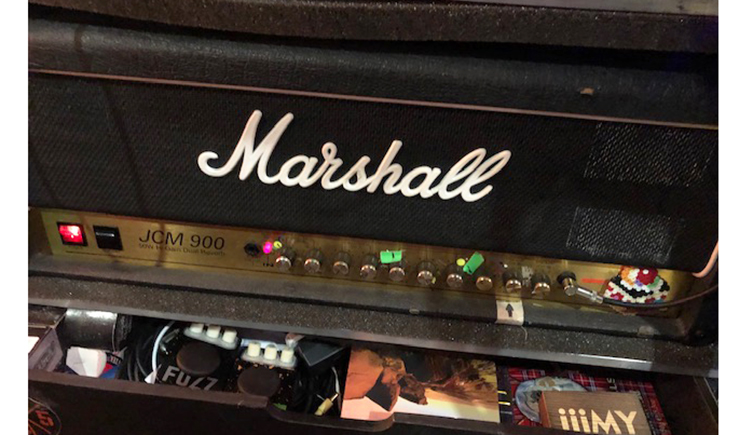
And on that, there’s all the delays and modulations and stuff, so you can literally be going (mines heavy riffage) and then (slaps table) it goes to clean stack with modulation and delay on it. So it’s exactly the same as the record. So, there’s not much, live, that isn’t the same as on the record.
GG: Awesome!
A: We have a few tracks where we have some backing track stuff on tape which has strings and loops, because they are part of it and you can’t play without the electronic drum beat.
GG: That’s standard these days.
A: Yeah, yeah and obviously the strings we took directly from the albums. Everything else, I’m playing and, um, now on stage, Skin play a bit on a song called ‘Ugly Boy’: she plays second guitar on that to big it up, and Ariel, our session player, she plays on our new single, she plays guitar on that. So, rather than putting guitar on backing tracks or anything like that, I’ll just either use either 5ths or Octavers to make my sound bigger, right, on two amps, and then Ariel or Skin will play a second guitar on three songs. So, it’s all still organic.
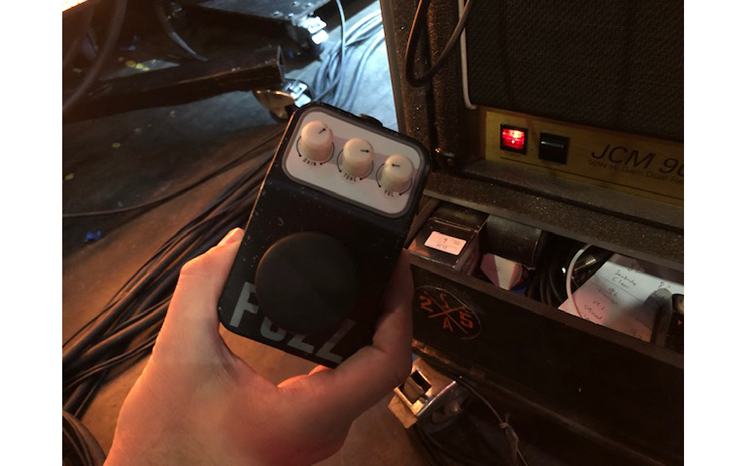
GG: And does Ariel play anything other than guitar?
A: No. That’s it.
GG: Right, got you. Right: guitars then! I remember my favourite one of yours was the black Les Paul Custom that was covered in stickers, it was badass!
A; Oh yeah, still got that!
GG: Nice! And one of my friends has the PRS SE Ace signature model. Very rare these days...
A: Yeah, they sold out, didn’t they?
GG: So, I’m guessing PRS is still your main squeeze?
A: Yeah, because the black Les Paul had the headstock on it snapped off five times. It kept happening, kept happening, right? And I had a red one as well, which I was using a lot but then a long time ago, nearly twenty years ago, I got involved with PRS and I had a Custom. Whenever we played it live or played it in the studio I loved it, and when we were going back on tour in 2008, and I just had my black Les Paul and I was just like: ‘How is this going to survive?’ and so I went to them (PRS) and said, ‘I need a guitar that’s just really, really stable, but sounds like this guitar’.
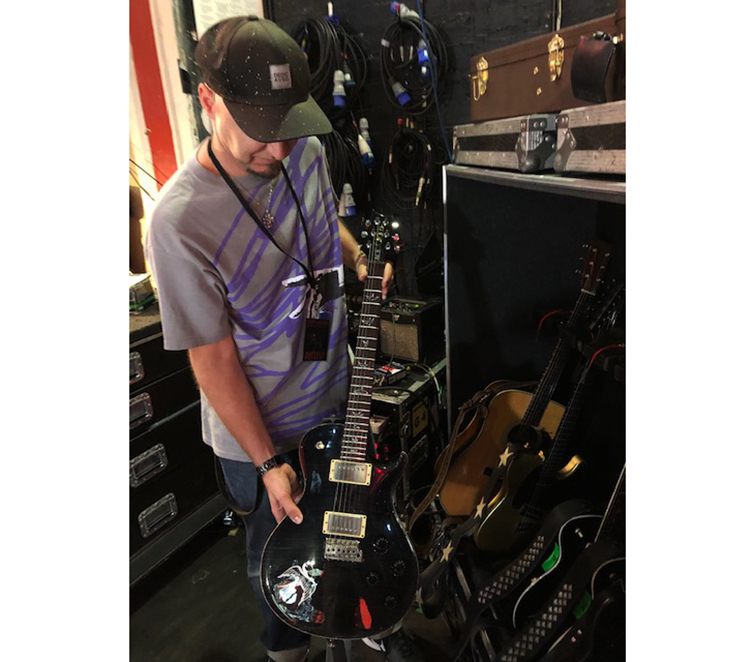
So, we went through all the stuff, and we found the Tremonti signature, and I changed the pickups to the 5708, which are very similar to the 1957 classics or whatever in my other one, and it sounded more or less exactly the same! I mean, no one could tell, not even the band could tell! But the guitar was really stable, and really in tune and better to play, so I switched then to Singlecuts. I’ve had Singlecuts ever since then, and I’ve got a few different ones, but my main one that I play all the time is my Tremonti one. It’s got a block in the bridge so the bridge doesn’t go back, it’s got a bit more sustain, it’s got coil taps in it: the whole lot, right? It just sounds fantastic and plays amazing!
And then up until this tour, I was using all different second guitars for different tunings, but I went back to Gavin (Mortimer, PRS UK distribution) and I said -because they made the Ace signature – can I have a couple of Ace signatures? And I modified them the same, so different machine heads, tremolo blocks, coil taps, 5708’s, so I supped them up and I tuned them up, so now I’ve got four black Singlecuts: I’ve got three Ace signatures and my main one. So, I play my main one through the whole show practically, and then I swap when I’m in different tunings.
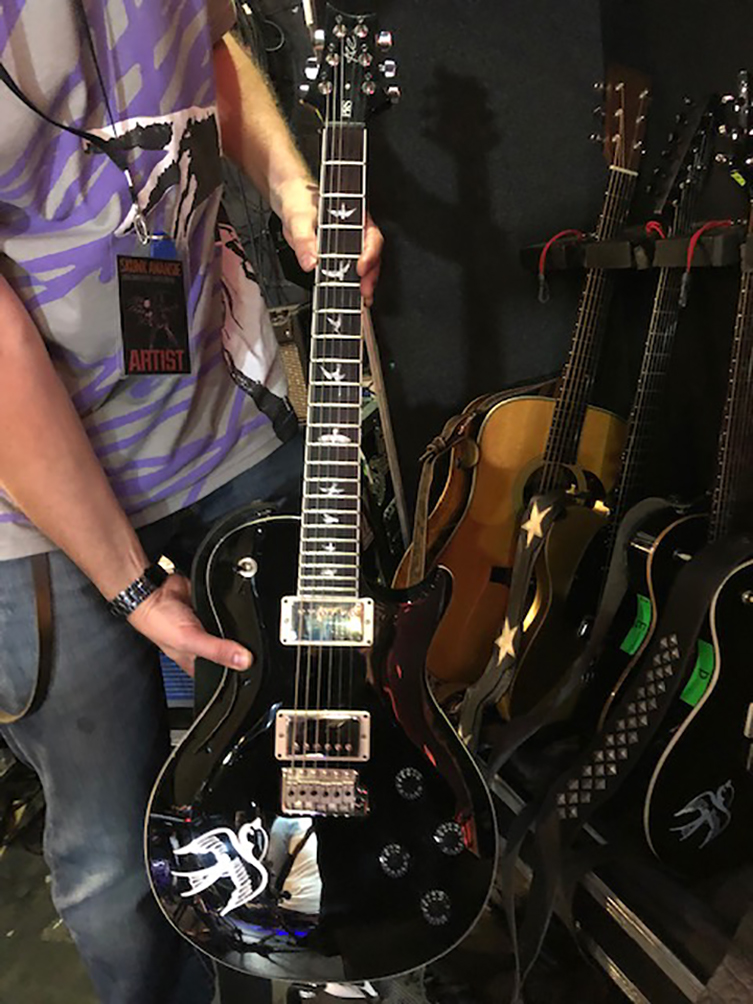
I play in D standard, D# Standard and E standard, and then I’ve got a spare in E. So, what it means is, it means I can keep on playing but I never notice the difference in the feel of the guitar or the neck.
GG: Which is everything during a performance.
A: Yeah, it’s like playing the same guitar all the way through.
GG: Yeah once you’ve warmed up on it, you don’t really want to have to deal with a totally different profile and radius etc.
A: Yeah, yeah, exactly! So, this is the first tour where I’ve gone out with just PRS’s. And I’ve got a Martin acoustic on tour with me as well.
GG: Nice! Champagne.
A: Yeah.
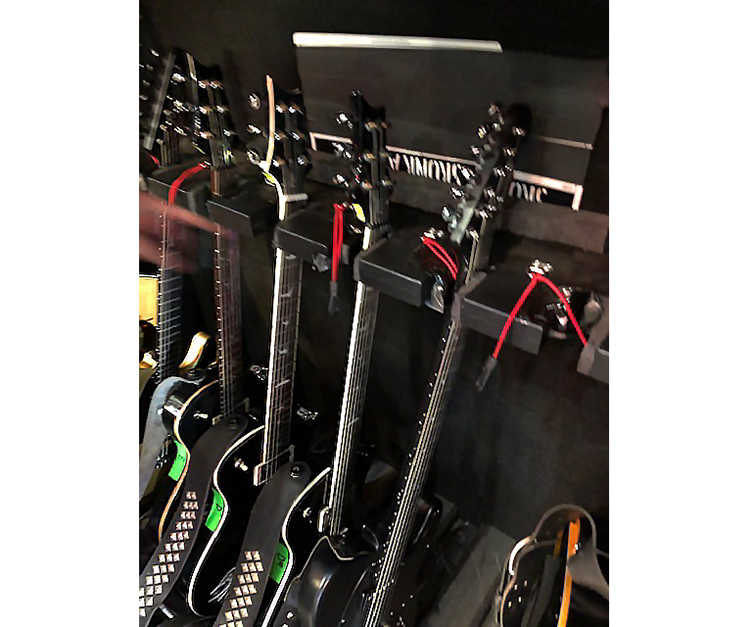
GG: So, one of the most attention-grabbing aspects of your playing is your use of effects pedals. It was you, Tom Morello and Jonny Greenwood! In fact, you used to do an article in...was it Guitar & Bass magazine?
A: Yeah, it was Guitarist.
GG: Guitarist, yeah! I used to read it and get loads of tone tips from it. So, pedal-wise, you were a bit Digitech guy, and DOD, which I think is the same company?
A: Yeah.
GG: So, what, in the last while, has gotten your attention in terms of pedals?
A: Well, Digitech and DOD were my kind of live standards because they never break. So that’s why I’ve got a lot of that stuff. My racks are the Digitech GSP 301, I think? It’s that rack anyway. (It later turns out to be the GSP1101. Ray) I’ve got a couple of those because I can just program all the clean sounds in there. My distortion sounds are the valve sounds from the amps and then I have a few pedals in front of it, I have like 8 pedals.
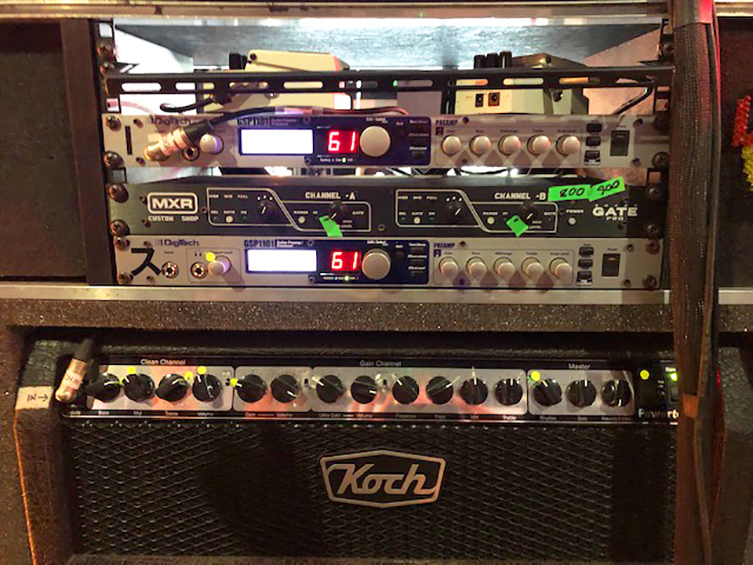
So live, that’s why I use Digitech. Hardwire are really good, they’re just great sounding and they work really, really well, and I’ve got some DOD stuff in there and some Whammies.
In the studio I just use everything! I’ve got like boxes of stuff, right? So, lately, stuff I’ve been using...I’ve been using a Nexi pedalboard, which is those Dutch guys. I’ve been using that in like songwriting and rehearsals, and I’ve actually made a fly rig: one where you can just open the case, it’s like this big (mimes a small rectangle shape) and you can go and do a gig, you know, in Portugal or something, and I’ve got 8 pedals ready on a board.
GG: Sure.
A: And its good, it sounds good. It really works for what it is but like, things for like good sounds, umm, I like-it’s not new but I’ve been using it on this tour for the first time-it’s not the Carcosa, it’s the DOD Dark Arts or something series, and it’s called...it’s a fuzz pedal and I can see it but I can’t remember its name...
GG: I tend to remember them more by their graphic than their name...
A: Yeah yeah, it’s the Bone Crusher, or Boneshaker? It’s a black and yellow pedal. They made two really good fuzz pedals, the Carcosa and the Boneshaker, I think it is. I’ve been using that for a really heavy, buzzy sound. Other good pedals...oh! The Gurus pedals are really good. I think they’re called Fox now, Foxgear?
GG: Fox? The only Fox I know is F-O-X-X from the 70s...
A: No, there’s a new company called Foxgear who are Italian, and Gurus is part of that. With Gurus pedals, it’s the Sex Drive, I think its called...Sexy Drive, that’s the little one: that’s good, but it’s...the 1959 Double Decker, that’s a good pedal. The Echosex, that’s an amazing pedal, a really good echo, like a tape echo pedal.
I really like the...there’s a company called VDL Analogics in Italy and they’ve got this vibe pedal, it’s a really beautiful sound, like a rotovibe sound, that’s really, really, nice, I’ve used that a lot. There’s so many good ones out there now, actually, so many good ones and I have so many pedals! And I buy some and I get given some. I built a mini pedalboard not that long ago, just all little mini pedals on there and I kinda went for the best ones I could get on there, and there’s a reeeeally good fuzz pedal on there and I can’t remember what it’s called! It’s a little grey one, tiny little grey one and it was the most expensive pedal on the board. Fantastic sounding fuzz pedal.
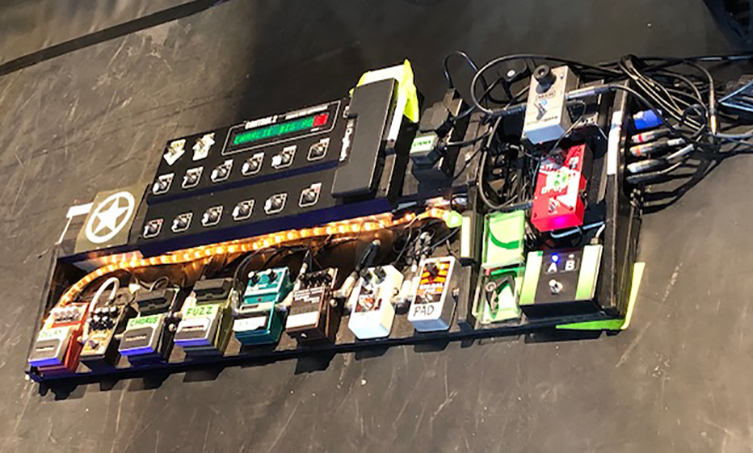
But I’ve got like a box at home of just overdrives and fuzz pedals, little separate ones where I’ll go ‘oh let’s try this old Hot Tubes’ or I’ve got this old Dickinson...thing, like y’know, a prototype, I’ve got my pedal which is the Hot Bird.
GG: The Hot Bird? I missed this one!
A: Oh yeah, it’s fantastic! The Hot Bird, it’s done by VDL Analogics, it’s all hand-wired, it’s like this massive pedal. One side is like this fantastic overdrive pedal/distortion and the other side is like a proper old analogue 70s fuzz, kind of like a Big Muff. It’s proper amazing but it’s expensive! We’ve sold a few but it’s real kind of artisan stuff: it comes in a box, and inside is a velvet cloth, and it’s about this big (mimes a relatively big square), it’s got loads of knobs on it and switches. You can change diodes in it for vintage and modern sounds, it’s like proper up there.
GG: I was gonna ask you ‘If you had to choose one fuzz pedal to rescue form the burning studio, what one would it be?’ but I guess that answers it!
A: No, it would be the original Ibanez Tubescreamer Super from the 80s. That’s the one that all the old sounds were and I had that on my board for years and years and years until it started to get a bit crunky so that probably my favourite ever overdrive sound. What it’s got is a ‘middle’ thing: it’s got Drive, Tone and Boost, whatever, but also a Middle switch and the Middle switch is what makes that good sound.
GG: Ah!
A: So, when we made the Hot Bird pedal, we got the schematics of that pedal, and it’s now in that pedal, you can switch it in. That’s what makes the good sound, that extra weight in the guitar.
GG: Are you talking about using the Tubescreamer where the gain is off, but the volume and tone are right up, and you’re using it in front of your dirty guitar sound? Or are you talking about using it for its overdrive?
A: No, I just put it in front of the gain sound to make it sound better.
GG: It’s so strange that: it always works!
A: Yeah! And I bought the mini one, for my mini board, and it actually sounds really, really good! But that one old pedal just got used so many times on everything, it was almost a default thing. So, I think that’s the one drive and it’s just a standard one but it’s from the 80s.
But if I was thinking of like a custom fuzz or overdrive, I actually really like the Hot Tubes, I used the original Hot Tubes back in the day for all the Skunk stuff. One pedal that’s really good is the Love Drive, by DOD, it’s a little one, and it’s this little pink pedal and it’s got a Japanese guy on it and it’s a signature model and it’s a slightly different version of the DOD 250 preamp pedal. That’s amazing and that’s worked across the board on everything. I’ve produced a lot of records and I’ve used that on loads of people’s records.
GG: It’s just one of those Magic Markers: it just works over everything.
A: Yeah, yeah. But you know what I used a lot as well was the Electro-Harmonix Micro Synth. That’s...when you look back at those old records and you hear all those really weird fuzzy sounds, that’s the Micro Synth.
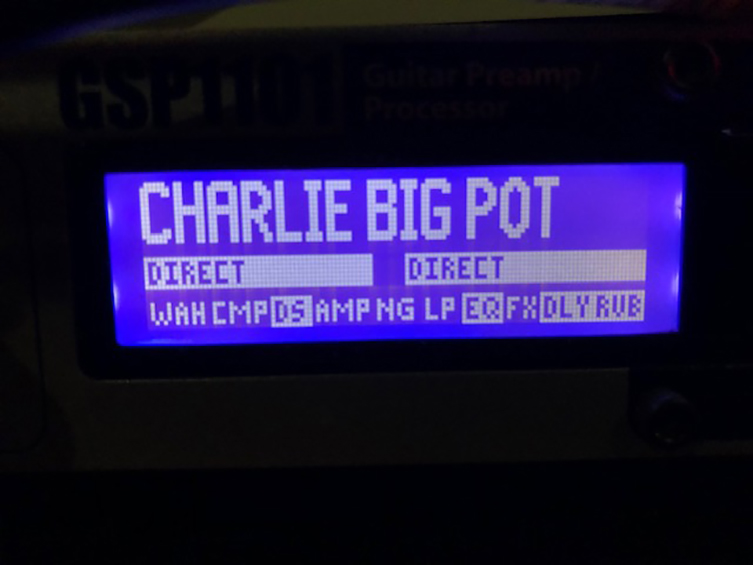
GG: Amazing! Now, bit of a tangent, bit I am super obsessed with plectrums.
A: Oh yeah?
GG: What do you use?
A: Actually, this is a good one, this, because I definitely believe they all sound different, right?
GG: I agree!
A: Defintely, definitely! I use the D’Addario Planet Waves Duralin ones, right? Which are the stamped ones, not moulded. And they’re like dull and quite hard, the green ones (.85mm, Ray), they just have a really good sound on the string, they’ve got a really fat sound. The reason I use those is because I was using Sharkfin plectrums for years and years. I loved them, and they just kind of disappeared. Then D’Addario sent me a bunch which had this little rubber ring on them, which were really nice because it stopped you dropping them, the Blue ones.
So, I was using them, and they were really good, I was using them for ages. Then, one day, I asked if they could send me some more and they sent me the green ones by mistake, the Duralin ones, and I tried them and was like: ‘Ah, I like these!’ So that’s when I said to them, ‘Oh look, can you make me some signature ones of those?’ So, every tour, they print me up a new set. They’re great.
GG: Loving it. And for your strings? If you’re in Standard Tuning?
A: Umm, D’Addario NYXL.
GG: Is it tens?
A: Yep.
GG: And when you’re tuning down?
A: Tune down, same. I used to use elevens all the time until I stopped touring a lot and then I found that when I was playing at home, they were too heavy! So, I dropped down to tens and the NYXL ones...I was always playing the XL ones for years because I loved the sound, they always sounded old as soon as you put them on, but with the NYXL they’ve got a better clean tone to them. And they last forever. A year they can stay on the guitar!
GG: So, this is such a generic question but I still want to ask it: what in your opinion makes a great guitar riff?
A: (pause) Space. Definitely. So you can hear it loud. Obviously simplicity for me. You know, my favourite ever riff, probably, for me, is Sweet Leaf.
GG: Yyyyeeeeah!
A: Haha! Lots of space in that! Pretty simple! And Whole Lotta Love! And you know, look at that! Our song Charlie Big Potato is only two notes! So, space and simplicity, right, and after that, just amazing tone.
GG: Tone’s everything, right?
A: Tone’s everything. So, with Whole Lotta love and Sweet Leaf, that sound grabs you and then the fact that it’s simple and It’s got a lot of space, and you can hear it loud, it makes you go ‘Whaaaa!’ Whereas if it’s really fast or really fuzzy, it’s hard to ‘get it’. It’s impressive sometimes, but...
GG; Here’s a thought: thinking about the first thing you said, space...
A: Mmm...
GG: And you've been a gigging player for decades now, playing loud volume...
A: Yeah...
GG: Do you think volume is part of this? What I’m thinking is: a lot of bedroom guys are uber-good at shredding, and write riffs that have 32 notes in them, but never getting the sound above bedroom levels...
A: Yeah...
GG: The guitar’s so different when it’s loud and it behaves so differently...
A: Totally! I totally believe in that! Look at AC/DC: that’s probably the simplest riff stuff ever. There is nothing simpler than AC/DC and that sounds so good loud and also people get it, right? So, if you play stuff that’s really simple that sounds really good loud, you’re gonna get a lot of people at one time ‘get it’, and that’s why they are so successful. I mean, great songs, obviously, but when you hear anything they do, it’s just like ‘oh my god’, fantastic!
GG: That’s like Rammstein as well, they never use more than three or four notes.
A: Yeah, and it’s great!
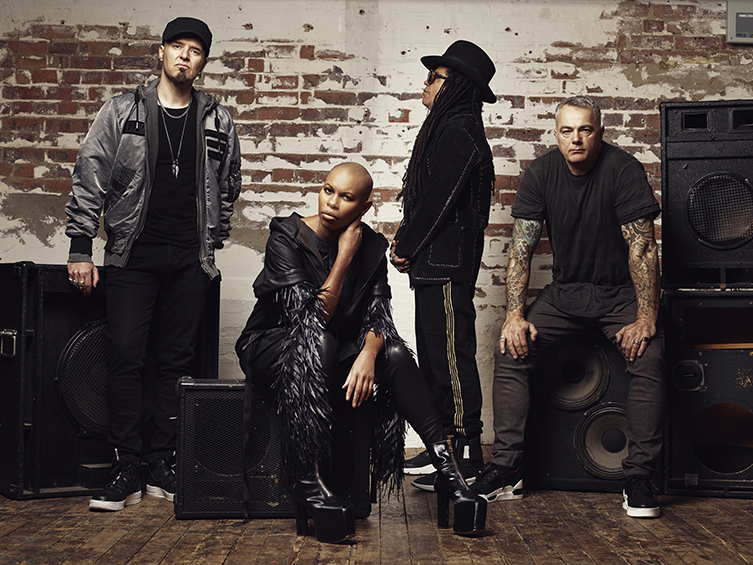
GG: So, this is something I heard Cass (Cass Lewis, Skunk Anansie bassist) saying, which I thought was an excellent quote: “We get the rebels because we are the rebels”. (Ace laughs) It’s so quote-worthy! That should be on the merch downstairs!
A: Yeah!
GG: This is a bit of a left curve from us talking about plectrums and stuff, and we can comment on it however you feel of course, but with the world as it is with Trump, Brexit, the badness that’s happening in the world right now...bands like Skunk Anansie, who are...I’m gonna use the word ‘confrontational’ but I mean that in a positive, constructive way: do you need Skunk Anansie now more than ever?
A: Well, I suppose so in a way because, at the end of the day it’s only music and we’re giving our opinions, right? But, it’s still another form of protest. And it’s still another voice that some people will kinda agree with. So, it’s like anything: you could go and stand on a street corner and go ‘We need to smash the state!’, right? You might get like 20 people agreeing with you. Those 20 people go and talk to 20 people and so on and all of a sudden, you’ve got a movement: ‘We’re gonna have a March on Saturday’ and a hundred people turn up. You know? And it’s done something!
So, if you get, like, Rage Against the Machine and they’re talking about stuff, they get a lot of people acting politically after getting into their music.
GG: Even if it’s a tiny percentage.
A: Exactly. So maybe even with Skunk, if you come to the show and you really enjoy it, and you go ‘Actually, what they said there is kind of right, I might apply a little bit of that to my life’...you think about it: we’ve played to over a million people this Summer. What if a percentage of that said “I’m going to do this, I’m going to change, I’m going to lobby against this, protest against this” ...yeah never know: they might know the right people and the right people. It could change something! Who knows?
GG: And even a small percentage, when you’re talking the numbers you guys are playing to, that’s still thousands of people.
A: Yeah, yeah! It depends how you say it, whether you turn people off or on, like how you say it in your music, but I suppose the thing is: there’s a space for all kinds of music, you know? Like ‘Hey let’s get drunk’ or ‘Oh I’m in love with you’ or whatever, there’s a space for everything but it’s nice to hear people talking about what’s happening in the real world and what’s going on around them, and actually caring about it.
GG; Yeah, giving a shit, basically.
A: Exactly!
GG: And of course, Skunk Anansie’s not just about politics: actually, quite a small percentage of Skunk Anansie’s music is overtly political, I’d say.
A: Yeah.
GG: It’s just the point that were made were pretty big ones.
A: YES! (Laughs) Exactly!
GG And with Skunk Anansie live, think of the energy people are leaving the show with!
A: Yes!
GG: And it’s reciprocal too, I’d assume?
A: Yeah, yeah! It’s true, it really is.
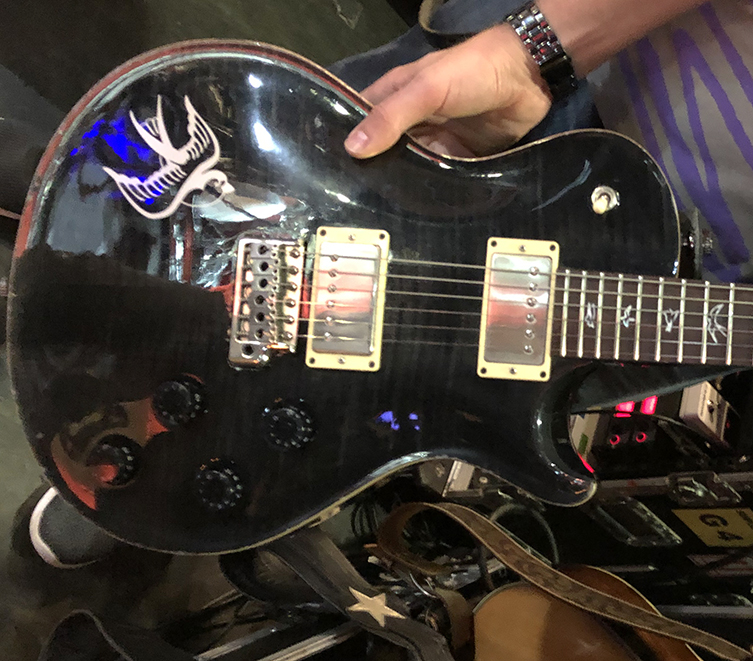
GG: How is it now compared to when you were in your twenties?
A: You know what? I was thinking about this. We’re in our fifties now, the band, but we’re still jumping around and still sound good, and all that type of thing, and I was watching some festivals the other day and I was way back and I could see the people of stage about that big (mimes a tiny thing) and I was thinking: it doesn’t really matter if you’re that old! As long as you still sound good, and you’re jumping around, right, people usually see you that big! They can’t see your wrinkles!
GG: They can’t hear your wrinkles.
A: (laughs) I like that, that’s a great quote: ‘they can’t hear your wrinkles’! Haha, that’s a headline, that is!
GG: They only want to know how hard you can rock. (Ace laughs) So, how has streaming affected things for Skunk Anansie?
A: Umm, it’s alright, because the radical turnaround in live gigs has compensated for it. All of a sudden, someone’s not buying your records, they’re streaming it. But that means, you go to Bratislava, and you can play a gig to 5000 people that you could’ve never done before. So all of a sudden, your gig fee for that has definitely equalled what record sales you would’ve had in that country.
Say, for instance...here’s a great example: say you’ve never been to Thailand or somewhere like that. Never played there. In the old days, when you were selling records, you’d have to go there and play the clubs for a few years to build it up to a level, right? That costs you a lot of time and a lot of money. You might be selling records there, but the record company’s kinda getting all the money anyway, right?
So, these days, you put your record out, everyone’s streaming it like mad in Bangkok and saying ‘we love the band, we want you to headline Bangkok Rocks (festival). Here’s two hundred grand. You go over and headline Bangkok Rocks and get your money, that goes straight to the band. You’ve not sold any records there, but you’ve made more money there than you would have from record sales. So that’s the way it’s working.
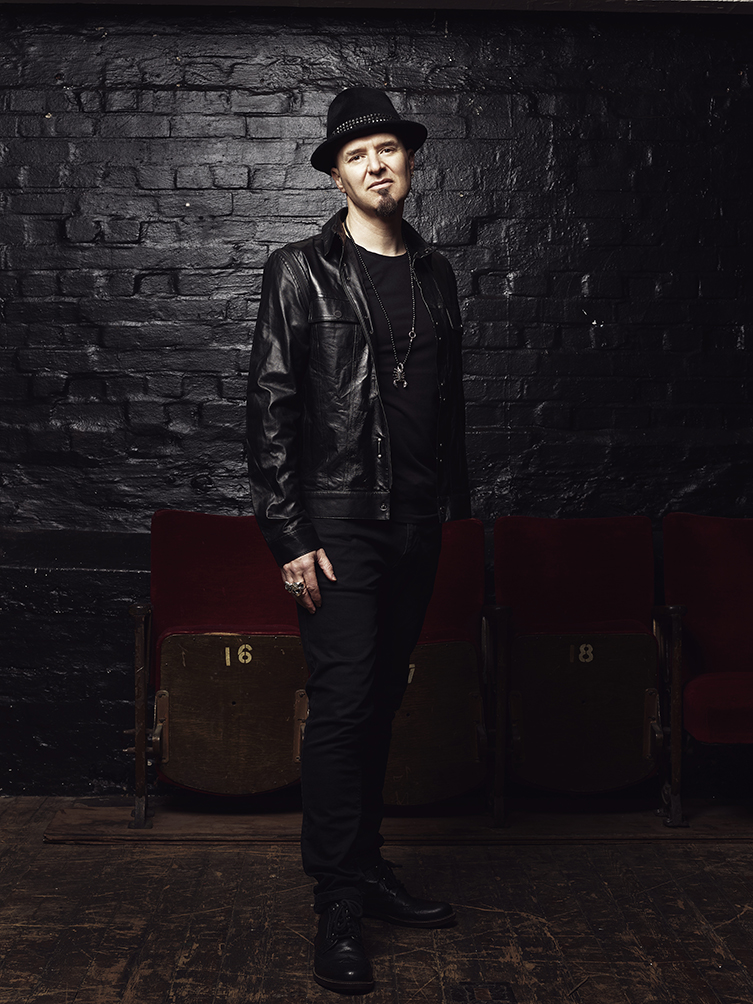
GG: I’ve never really thought of it that way: the level of audience you’re expecting elsewhere.
A: Exactly! So, you’re playing really big venues in countries you’ve never played: you’ve never had to build that up. You’re getting gig fees that are more than your record sales...before, you would be losing money going over to play. You could go and play a gig over in America or something, if you get a lot of people streaming your stuff there, and you could make fifty grand there or something, whereas you could never do that, you’d lost fifty grand playing to America before.
So, for us, being a really good live band, the streaming thing has actually turned it around. It’s gone from losing money on live shows, selling records, to losing money selling records and making money doing live shows. Also with streaming, when a new record comes one, everyone can hear it and go ‘Ooh, I might buy a ticket for that’, and ticket prices are a lot more than what you’d (the artist) get for a record. So for us, as a live band, it’s really good, If you’re not a live band, it’s not. Those people are inevitably skint all the time.
It’s a win-win situation really. You can advertise free online with social media, so that cuts a lot of that out; people can access all of your stuff all of the time everywhere for nothing so they can test it out, even if they don’t wanna...’Ooh, just check it out, Oh, I like this!’ and they come into town and buy a ticket and so on.
GG: Ace, you’ve restored my faith straight away.
A: It’s just about the way you do it!
GG: There are so many naysayers about digital streaming.
A: Yeah, yeah! You’ve just got to look on the advantage. I never made any money from records in the 90s. The money I made in the 90s was from advances and publishing. Didn’t make any money off records or gigs!
GG: And you guys have sold millions of records!
A: Yeah! And now, even with streaming, that’s going straight to the artist. And you get the ability to tour and all that stuff.
GG: I never thought about it like that.
A: Yeah. These days, because of how incomes stream work, if you can navigate the business of your business, you can be successful and sustainable.
GG: Brilliant.
A: Yeah.
Not long after this, Ace got the call to come down and soundcheck. After seeing his guitars, Ace led me out the back door and back to the street. His boundless energy remained: after speaking to me, he was heading back to write some course modules for his ACM job! We bid each other farewell and Ace headed back into the venue.
I returned that evening to catch the show. Ace’s guitar was one of the best live tones I’ve ever heard (the other being Steven Wilson, another PRS player, which is interesting...) and Skin is easily one of the greatest front people in existence, no hyperbole. Awe-inspiring. Incredible.
There’s still no band like Skunk Anansie. They have more tunes and more attitude most heavy bands, as well as having a catalogue of songs that amounts to an impressive best of to intimidate any other band. Catch them next time they are in your town, don’t think twice!
I’d like to thank Ace for his generous time and easy vibe. I’d also like to thank Jenni Vodden for all her help in setting this up for me.
Keep up with everything Skunk Anansie on their website. You can check out Ace’s guitar academy here.


